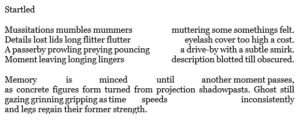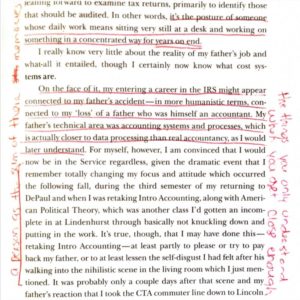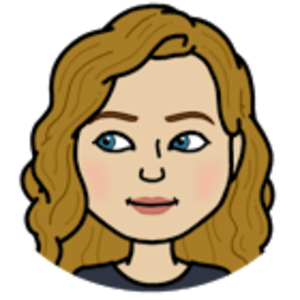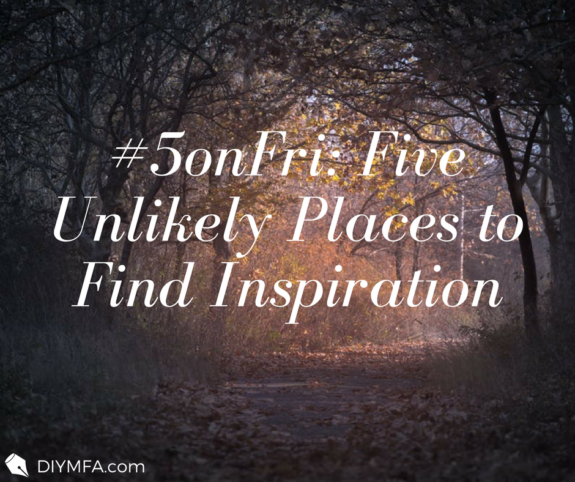Inspiration is more than reading between lines. Inspiration is about carefully dissecting lines and considering all potentialities falling between them. It is about deep considerations, personal cares and frustrations, and snippets of words watered and grown like weeds. Inspiration is what lies beneath what is most obvious. It is a spark, a flicker, and a flame. Here are five unlikely places to find it.
1) Channel Personal Frustration
I am of the belief that the best fiction is based on truth and the writer’s personal cares. Perhaps this is because I am not very creative and lean on my real-life experiences in my own writing, but I think it is more than that—great writers are great observers.
It is difficult to write what you don’t know. This is why many debut novels are masked memoirs. But back to the point: you can find inspiration not just in what you think about, but in what you feel about. When you are upset, dissect it, and dissect yourself in relation to it. Why do you feel how you feel? What are the underlying sources of your frustrations? Think about them from the opposing point of view. In the story of your frustrating situation, are you a likeable character, or part of the problem?
For example, I recently wrote a short story that focuses on a woman who is torn between holding on and letting go in a world where everything is replaceable. I based it on my mother’s refusal to purchase dented cans in the supermarket (and my sympathy for all the products that are garbage before they are purchased for similar reasons). I used this one small shopping habit of my mother’s to develop a story that not only referenced that habit and my feelings about it, but further explored my worldview.
2) Let Your Mind Wander
To quote my favorite self-proclaimed creative genius, Kanye West: I inspire me. This may sound narcissistic or absurd, but it’s true. Inspiration is something that starts with and within you. It is how you personally draw connections and attribute importance. Inspiration is entirely internally motivated, but it is also fleeting. As quickly as inspiration strikes, it evaporates. So, the trick is capturing it.
I enjoy going on walks when I am trying to develop new ideas or am stuck on a project. There is something about going for walks that allows me to escape myself and find freedom from the pressures of over-productivity I am sometimes plagued by while sitting at my desk to type.
For example, I had never written a story with dialogue until a few months back. Dialogue terrified me, mainly because there is such a specific spark to well-written dialogue, and an obvious lackluster flatness to poorly-written dialogue. Not being able to write dialogue, however, was holding my short stories back, and had stopped my novel in its tracks. So, I put my headphones on, stepped outside, and let my mind wander.
During that one walk, I discovered the key to writing dialogue: writing what it sounds like. This probably seems obvious to the point of silliness, but this discovery was such a singular moment of clarity for me. I was only able to arrive at it by separating myself from my desk, keyboard, and self-imposed deadlines and goals.
Instead of trying to make characters talk by writing words on a page, I realized I should think about what the characters would actually say to each other to convey what they were trying to convey, and in turn, what a response to the spoken words would sound like (I have since written several dialogue-only stories—sort of tape-recorder-in-a-room, in terms of style—that I am very happy with).
Be aware of your mind while it wanders off the path of your familiar concerns and thought patterns. Instead of sitting at my computer and trying to force dialogue, I stepped away and allowed my mind to find the solution.
3) Check the Word of the Day
I wouldn’t recommend this for every situation, but sometimes, when I am looking to jumpstart my creativity, I look to Dictionary.com’s Word of the Day with the goal of using the Word in something. I don’t usually do this when I am working on a specific piece (unless the Word inspires me to write something related to a piece on which I am currently working).
One such day, the Word was ‘mussitation,’ which is a noun meaning the ‘silent movement of the lips in simulation of the movements made in audible speech’ or ‘muttering; mumbling; murmuring.’ It should be clear which definition I was drawing from in this poem:

As a bonus: this is always a great way to expand your vocabulary.
4) Find Dialogue
As I mentioned, I used to be terrified of writing dialogue. To try to overcome this, I started focusing on conversations I overheard in my daily life. Yes, this sometimes involved eavesdropping while sipping beers alone in bars, but it also forced me to focus more during the conversations in which I was an actual participant.
I started thinking (obsessing) about word choice and questioning how often the listener’s connotation of specific words and phrases obscures the speaker’s intended meaning, which helped me tackle dialogue in my stories in (I think) a more natural way.
More simply: I started thinking about how complex dialogue is, and appreciating when I found nice, little spoken fragments that highlighted this complexity or summarized an idea succinctly.
As I mentioned, I have recently written several tape-recorder-in-a-room-style pieces. One such piece was inspired by casually listening to a conversation while I was working at a coffee shop. A man walked over to a woman a few tables away from me, introduced himself, and asked if he could sit down. I assumed he was interested in her and trying to make small talk before asking for her number, but I was completely wrong: she was a matchmaker, and he was meeting with her to discuss what he was looking for in a partner.
For the story I wrote about this encounter, I wanted to focus on my own misunderstanding of the situation, and so I wrote the story with intentionally vague dialogue at the start, so the reader is at first unaware why these two people are talking.
5) Read Actively
I get a lot of my inspiration from books. This one might seem obvious—a good writer is first a good reader, and all that jazz—but when I say I find inspiration from books I read, I don’t mean ‘I read a book, liked the story, and want to tell a similar story.’ I mean that I read the way the words are written, consider what the author was thinking while writing those specific words, interpret the words and the intentions, underline, take notes, and make comments in the margins.

The image shown is an example of a page in a book I am currently reading (The Pale King by David Foster Wallace).
The second underlined bit, along with my interpretation of it inspired a short story. It has very little to do with the section I underlined, but thinking about everything that section meant allowed me to go beyond the words to form a connection that may not have been obvious at first glance.
Here is a passage from my story that shows the main theme:
With active reading, it is possible to find inspiration in almost any piece of writing. Inspiration is about much more than what you are thinking, or what you expose yourself to. Inspiration is what you feel about. It’s what elicits a response. It is the cause. You are the effect, and like the flutter of a butterfly wing or a stone causing ripples like tiny waves: it’s up to you to affect others with what you have to say.
 Danielle is a former engineer and data scientist turned writer who lives in Philadelphia.
Danielle is a former engineer and data scientist turned writer who lives in Philadelphia.







